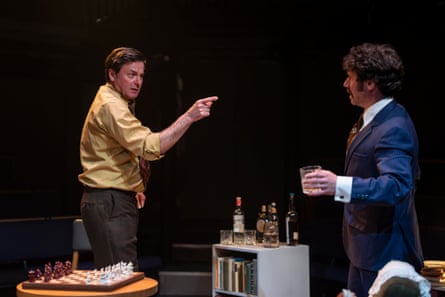Terence Rattigan distilled the unassailable emotional permafrost that settles between his upper middle-class English couples with a singular mastery. But this production shows his late work contains genuine warmth – and love – beneath the disappointments and dishonesties of married life.
Longsuffering wife Lydia (Claire Price) seems stranded in her marriage to the pompous and hectoring Sebastian (Dominic Rowan) who – quite literally – cannot change a lightbulb without her assistance. When they are visited by successful American writer Mark (Daniel Abelson), who has always loved Lydia, the plot seems to promise a love triangle.
But this play, written as part of a double bill in 1973, wrongfoots those expectations. It veers in several directions, from serious illness and impending death to father-son wrangles between Sebastian and Joey (Joe Edgar), who is an aspiring TV writer. Thrown into the mix is Lydia’s “outsider” status (she is Estonian) with talk of refugees as outsiders to “Englishness” along with the lived memories of the Holocaust, as well as political debates that set Sebastian’s champagne Marxism against Joey’s embrace of the Liberal party.
The play was said to be loosely inspired by Rex Harrison and his last (sixth) wife, Kay Kendall, who died two years after they were married, in 1959.

The play creaks with female sacrifice that feels peculiarly of its time: Lydia lives in service to Sebastian, tending to his every need. And even when she suspects him of an affair, she still plans for his future welfare. Directed by Amelia Sears, the production does not try to disguise the datedness. This is a 1970s world of tiny black and white TV sets, drinks cabinets and dutiful wives.
Staged four years before Rattigan died in 1977, it deals with impending death, but also the characteristic peering under the bonnet of a couple’s secrets; Lydia with her illness, Sebastian with an off-stage female lover who might well be the coded homosexual partner often found in Rattigan’s work.
There is nervy humour and Price gives a delicate performance as Lydia, capturing the psychological subtleties of her part, while Rowan is sufficiently sledge-hammer as her boorish husband. Still, it is not as monumental a play as The Deep Blue Sea, also about the disenchantments of romance, nor is it as chamber-like as some of Rattigan’s double-bills (such as Summer 1954). The parts of Joey and Mark feel like cogs to the plot, which itself is so busy that it dilutes emotional focus.
But it is a tender work that leaves you with the picture of a family, fractious certainly, but loving too in their own way – and together until the end. Like so many Rattigan marriages, there are secrets and lies here but underneath there is a love that smoulders.

 3 months ago
57
3 months ago
57

















































